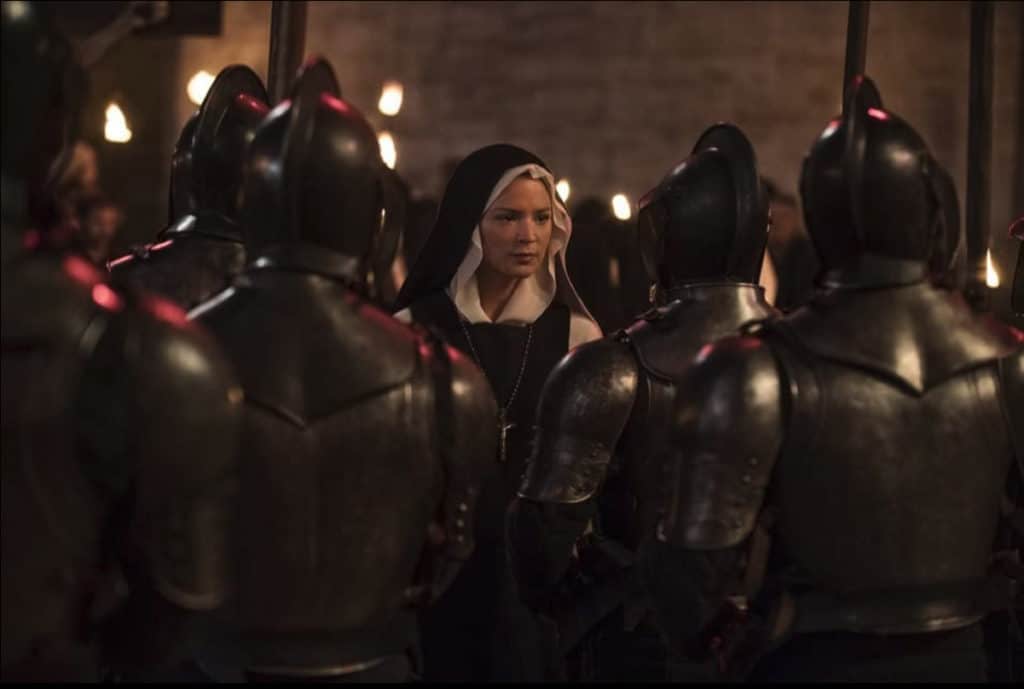Moviegoer: Benedetta

A nun’s visions threaten to shake the foundations of the church
By Diana Beechener
Benedetta is in theaters Dec. 3 and on-demand Dec. 21
Benedetta (Virginie Efira: Night Shift) has always heard the call of the Lord. Even as a child, she felt a personal connection to her town’s Virgin Mary shrine. Her wealthy merchant father agrees to pay for Benedetta to enter the convent (which charges a stiff fee to accept young women in counter-reformation Italy).
But convent life isn’t quite what Benedetta expected. As a plague ravages the surrounding towns, the convent is more concerned with strict regulations, pious platitudes, and collecting money than easing suffering. At night, Benedetta dreams of Jesus, and the two have grand adventures. She believes that she’s being given prophecies and visions from God himself. During the day, the Mother Superior (Charlotte Rampling: Dune) regards Benedetta with suspicion and skepticism.
Things change when Bartolomea (Daphne Patakia: OVNI(s)) crashes into the church, begging for sanctuary from her abusive family. She’s immediately denied—if she can’t pay, she can receive no mercy from the church—but Benedetta intervenes, convincing her wealthy father to pay for Bartolomea.
Benedetta’s visions become more intense, and Bartolomea’s attention becomes more pointed. Soon the two are having an affair, but Benedetta sees it as sanctioned by God rather than a sin. When Benedetta begins to display signs of the stigmata, the church can no longer ignore her proclamations.
Is Benedetta a holy mouthpiece? Or has she merely decided to manipulate those around her as the church does?
Just in time for the holidays, director Paul Verhoeven (Elle) presents a lurid musing on the hypocrisy of the Catholic church. Not quite a Christmas card, Benedetta is a deeply cynical film that features enough sex, scandal, and sacrilegious content to offend nearly everyone at the family holiday party. Seriously, don’t take the kids or your grandma with the weak heart to see this movie. The best part? It’s based on the true story of a lesbian nun who was revered as a saint and condemned as a sinner in 17th century Italy. Sure, Verhoeven plays fast and loose with the historical bits, but the actual account of Benedetta’s life will raise some eyebrows as well.
Verhoeven has long had a history of salacious filmmaking, but when he’s at his best, all that provocation has a point. Benedetta has a lot to say, but Verhoeven falters on his message at times, letting his Grand-Guignol aesthetic get in the way. The movie is at its best when it shows the machinations behind the church—where rising in the ranks and political clout are more important than the messages preached. Verhoeven also has a great sense of how easily zealots can be manipulated. He outlines how the church and Benedetta use fear to manipulate the townspeople, and how those fears breed violence. But by refusing to take a stand on whether his main character’s mysticism is purely for show or God-given, Verhoeven steps on his own message.
Helping keep this movie from devolving into a sexploitation film are some truly remarkable performances from Efira and Rampling. Efira as the brilliant Benedetta transforms from true believer to shrewd manipulator. Opposing her is Rampling, as a world-weary nun who believes in the political power of the church more than the dogma. It’s an interesting clash, and one that produces some of the films best scenes.
Benedetta is not a film that’s going to change anyone’s mind. If you’re devout, this will likely be a direct provocation. If you’re not big on the church, you’ll find many of your complaints confirmed. But if you’re interested in discussing how religion shapes society and behavior—or how Verhoeven’s tendency toward the sensational helps or hurts his intentions—Benedetta is an excellent conversation starter.
Good Drama * R * 131 mins.
